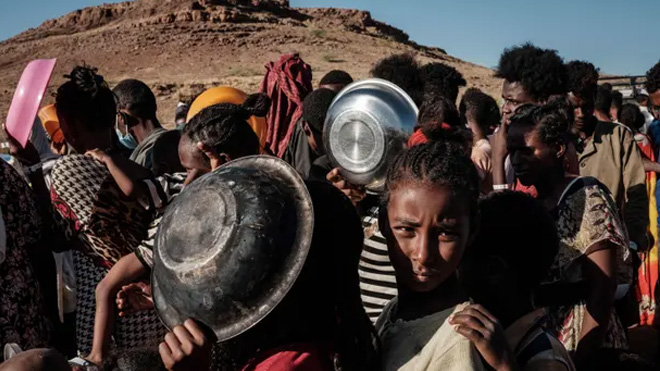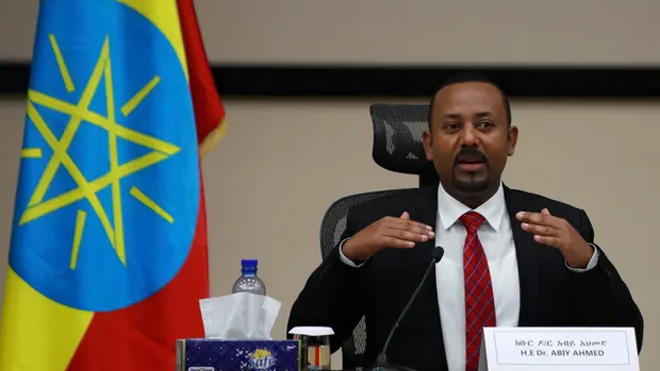Ethiopia’s leader must answer for the high cost of hidden war in Tigray
Abiy Ahmed should hand back his Nobel peace prize over his actions in the breakaway region that have raised the spectre of famine again

Seyoum Mesfin, Ethiopia’s long-serving former foreign minister, was one of the foremost African diplomats of his generation. He was gunned down this month in Tigray by the armed forces of a lesser man – Abiy Ahmed, Ethiopia’s prime minister and Nobel peace prize winner. Some suggest it was the Eritrean military, Abiy’s allies, who killed Seyoum, although their presence in Tigray is officially denied. The circumstances of his death remain murky.
As with much of the unreported, unchallenged murder and mayhem currently occurring in northern Ethiopia, murky is what Abiy prefers. When he ordered the army’s assault on the breakaway Tigray region in November, he blocked the internet, shut out aid agencies and banned journalists. It’s a conflict he claims to have won – but the emerging reality is very different. It’s a war fought in the shadows, with the outside world kept in the dark.
After humanitarian workers finally gained limited access this month, it was estimated that 4.5 million of Tigray’s 6 million people need emergency food aid. Hundreds of thousands are said to face starvation. The UN warns that Eritrean refugees in the Mai Aini and Adi Harush camps are in “desperate need of supplies” and harassed by armed gangs. Some are said to have been forcibly, illegally repatriated.
Access continues to be denied to two other camps, Shimelba and Hitsats, which have been set ablaze. Many of the camps’ residents are believed to have fled marauding Eritrean and Amhara militiamen. Satellite images published by UK-based DX Open Network reportedly show damage to 400 structures at Shimelba. Filippo Grandi, head of the UN refugee agency, points to “concrete indications of major violations of international law”.
There are persistent, unconfirmed reports of massacres, torture, rapes, abductions, and the looting or destruction of centuries-old manuscripts and artefacts across Tigray. Last week, EEPA, a Belgium-based NGO, described a massacre of 750 people at a cathedral in Aksum that reputedly houses the Ark of the Covenant. Ethiopian troops and Amhara militia are accused of the killings at the Church of St Mary of Zion, part of a UN World Heritage site. The report has not been independently verified.

Despite Abiy’s claims that the war is over and no civilians have been harmed, sporadic fighting continues, an analyst familiar with government thinking said. Thousands of people have died, about 50,000 have fled to Sudan, and many are homeless, sheltering in caves. Intentional artillery attacks have destroyed hospitals and health centres in an echo of the Syrian war, the analyst said.
Meeting this month in Mekelle, Tigray’s capital, aid workers complained Ethiopia’s government was still hindering relief efforts and demanded full access. “People are dying of starvation. In Adwa, people are dying while they are sleeping. [It’s] the same in other zones,” a regional administrator, Berhane Gebretsadik, was quoted as saying. But there has been scant response from Addis Ababa.
Official Ethiopian and Eritrean denials that Eritrean forces are operating in Tigray are contradicted by eyewitness accounts. Amid the murk, it seems clear Eritrea’s dictator-president, Isaias Afwerki, has made common cause with Abiy. The two met in Addis Ababa in October, shortly before the war was launched, to discuss the “consolidation of regional cooperation”.
Afwerki is an old enemy who runs a brutally repressive regime. But he shares Abiy’s hatred of the Tigrayan leadership that dominated the government of former prime minister Meles Zenawi during Ethiopia’s 20-year border war with Eritrea. Abiy, an Oromo from Ethiopia’s largest ethnic group, made peace with Eritrea in 2018, ousted his Tigrayan rivals, and has been feuding with them ever since.
Further evidence of secret alliances comes from Somalia. The Somali Guardian reported this month that 2,500 Somali recruits were treated as “cannon fodder” after being sent to a military base in Eritrea for training, then deployed in Tigray with Eritrean forces. Dozens are reported to have been killed.
International scrutiny of Abiy’s Tigray war has been largely lacking. An exception is the EU, which has indefinitely suspended €88m in aid to Addis Ababa. “We receive consistent reports of ethnic-targeted violence, killings, looting, rapes, forceful return of refugees and possible war crimes,” Josep Borrell, the EU foreign affairs chief, said.
The UN and EU warnings, coupled with the shocking murder of the internationally respected Seyoum Mesfin, may now bring closer scrutiny. I met Seyoum, a co-founder in 1975 of the Tigray People’s Liberation Front, in Addis in 2008. He was a master diplomat. According to Alex de Waal, the Africa specialist, Seyoum was a skilled peacemaker in Rwanda and Sudan who “presided over the rehabilitation of Ethiopia’s international standing” after 1991.
Abiy now risks destroying that standing. “The circumstances of Seyoum’s killing aren’t clear. The Ethiopian government is not a reliable source of information. Eritrea – which may well have carried out the assassinations – is remaining silent. The official report that Seyoum and his colleagues ‘refused to surrender’ is opaque,” De Waal wrote.
He noted that the two other elderly Tigrayans killed alongside Seyoum, aged 71, were Abay Tsehaye, who had just had heart surgery, and Asmelash Woldeselassie, who was blind. This trio hardly posed a physical threat to heavily armed troops.
Abiy seems to have lost control of events. There is anger in Mekelle, where a puppet administration has been installed, about ongoing security issues, including rapes. The threat of rural famine looms large. In the mid-1980s, mass starvation in Ethiopia shocked the world. About 1 million people died. Those horrors were subsequently vanquished by decades of hard work.
To Abiy’s great shame, the spectre of famine now haunts Ethiopia again. The good work of the past is being undone. He should hand back his Nobel peace prize and answer for his actions in Tigray.


![[AIM] Asmarino Independent Media](/images/logo/ailogo.png)
